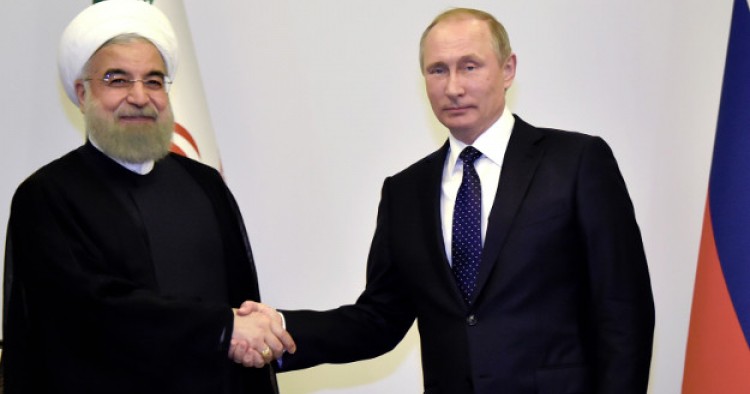Iran’s President Hassan Rouhani is rushing to Moscow for talks with his Russian counterpart Vladimir Putin in March, Iranian and Russian media confirm. Rouhani’s trip may be an attempt to ensure that Moscow would not sacrifice Tehran as part of a grand bargain with Washington. According to a February 5 report in the Wall Street Journal, Washington “is exploring ways to break Russia’s military and diplomatic alliance with Iran in a bid to both end the Syrian conflict and bolster the fight against Islamic State.” In that regard, signs of tension in relations between the two countries, particularly in connection with the future of the Syrian war, are emerging.
There are signs Russia is trying to curtail its military involvement in Syria and find a political end to the conflict, But Iran, which controls the war dynamics on the ground, is still pushing for a military victory in Syria. Indeed, Russia’s ambassador to Iran Levan Dzhagaryan said on Monday that Syria will be a main theme of discussions between Rouhani and Putin next month. He added that the two leaders will also talk about other regional issues, including Afghanistan. In the past one year, Russia and Iran have deepened their ties with the Afghan Taliban, which has alarmed the Afghan government and triggered protests from Kabul over Iranian intervention in Afghan internal affairs.
Tehran is also likely to seek Moscow’s help to upgrade its military capabilities and expand its influence across the Middle East. In recent years, Iran and Russia have cooperated closely to prop up the Baathist dictatorship in Damascus, in a bloody war that has killed almost half a million Syrians. After the 2015 Iran nuclear deal, Russia delivered the S-300 missile defense system to Iran despite objections by the U.S. and Israeli governments. And last November, Tehran and Moscow began negotiating the supply of around $10 billion worth of arms and military hardware to Iran – including T-90 tanks, artillery, planes and helicopters.
The Middle East Institute (MEI) is an independent, non-partisan, non-for-profit, educational organization. It does not engage in advocacy and its scholars’ opinions are their own. MEI welcomes financial donations, but retains sole editorial control over its work and its publications reflect only the authors’ views. For a listing of MEI donors, please click here.













